
Rain Lau Yuk-chui
Rain Lau hit the screen like a mini-tornado
in 1990. As the sullen but spirited daughter of Sylvia Chang in Queen of
Temple Street, she was a wonder and a delight. Her youthful, spirited,
spit in your eye performance made her seem like no other HK actress I have
come across. She received the Best Newcomer Award for this, but oddly her
career never really seemed to flourish as one might expect. She has appeared
in only some ten films and in many of these her role was minor. I wish
I knew the reason why – perhaps her gritty characters just never sat well
with Hong Kong audiences.
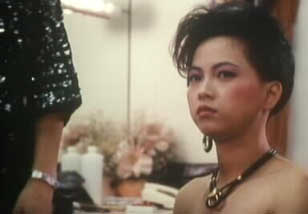 In It’s Now or Never in 1992, she gave another
tough girl performance – hard as rock candy on the outside and tender as
marmalade on the inside. As Cheung Man’s sister she nearly steals the film.
Another solid part was as a young lesbian in Candlelight’s Woman in 1995
(in which she takes on bad guy Shing Fui On in a gut wrenching fight) .
Her short haired look and curled lip in these early films was very distinct
and made her almost look like a tiny female version of Elvis Presley.
In It’s Now or Never in 1992, she gave another
tough girl performance – hard as rock candy on the outside and tender as
marmalade on the inside. As Cheung Man’s sister she nearly steals the film.
Another solid part was as a young lesbian in Candlelight’s Woman in 1995
(in which she takes on bad guy Shing Fui On in a gut wrenching fight) .
Her short haired look and curled lip in these early films was very distinct
and made her almost look like a tiny female version of Elvis Presley.
 Since then she has had small roles in Ah Kam –
the wife of one of the stuntmen, Tri Star and Troublesome Night 3.
Since then she has had small roles in Ah Kam –
the wife of one of the stuntmen, Tri Star and Troublesome Night 3.
Caroline Chai had this to add about what Rain
has been up to since her film career slowed down:
Rain Lau Yuk Chui has been at TVB for quite
some time now and is often cast in comic roles or used as comic relief.
In her early days she actually did get fairly substantial roles, like her
role in Man of Wisdom (1993, Lawrence Cheng, Ada Choi, Chui Kar Po).
Sadly even though most consider her a good actress, she's considered too
short and probably not pretty enough to be leading material at TVB.
She used to sing too and has a few albums to her name but I think they
are all out of print since I couldn't locate any when I tried to recently.
Rain Lau sang two of the sub-theme songs for Man of Wisdom and she sounded
quite good.
Ray Lui Leung-wai
Born 12/22/55 in Vietnam
Ray Lui is one suave sharp looking guy. Every
crease looks right in place with this guy as if he just stepped out from
being dry cleaned. It didn’t matter if he was playing heroes or villains,
he always looks like he has the world in his side pocket. He was great
looking when he started in films in 1980 and he still looks great today.
These good looks have made him a leading man in all types of films from
triad to historic and from comedy to drama. This square jawed actor with
the debonair air also has quite the reputation as a lady’s man and his
relationships with other actresses have been a staple of gossip pages for
years.
 He came to Hong Kong when he was twelve and after
being encouraged by his father to join an actors training class, Lui
was a fairly big star at TVB by the early 80's. The show that did this
was the same one that made Chow Yun Fat a TV star – The Bund (aka Shanghai
Beach; which was later brought to the big screen -- but san Lui and Chow
-- by Tsui Hark as Shanghai Grand). He was in some interesting films in
this decade – Dangerous Encounter of the First Kind, Health Warning, Project
A II, Four Loves, but none of them made him a film star.
He came to Hong Kong when he was twelve and after
being encouraged by his father to join an actors training class, Lui
was a fairly big star at TVB by the early 80's. The show that did this
was the same one that made Chow Yun Fat a TV star – The Bund (aka Shanghai
Beach; which was later brought to the big screen -- but san Lui and Chow
-- by Tsui Hark as Shanghai Grand). He was in some interesting films in
this decade – Dangerous Encounter of the First Kind, Health Warning, Project
A II, Four Loves, but none of them made him a film star.
It was the 1991 triad film, To Be Number One,
that did this for him. In this epic gangster film, Lui plays the main character
and the film tracks his rise and fall in the triads. It was a bravura performance
and the film was a smash hit (in the comedy Days of Being Dumb the two
wannabe triad members Tony Leung and Jacky Cheung have a big poster from
the film on their wall) and Lui was soon being overwhelmed with film offers.
In many of these he played characters that were almost bigger than life
- often based on real historical figures. Some of these were Man of the
Times, Hero of Hong Kong 1949, Lord of East China Sea, Incorruptible and
The Great Conquerors Concubine.
 For the first half of the decade, Lui was one
of the top male actors in Hong Kong. Since then his film productivity had
slowed dramatically, but he is again appearing in a number of films – some
recent ones are – The Suspect (1998), The Mistress (1999 – appearing as
the promiscuous main man in his ex-wife Crystal Kwok’s film), 2000 A.D.,
and Undercover Blues (which he co-produced as well as starred in).
For the first half of the decade, Lui was one
of the top male actors in Hong Kong. Since then his film productivity had
slowed dramatically, but he is again appearing in a number of films – some
recent ones are – The Suspect (1998), The Mistress (1999 – appearing as
the promiscuous main man in his ex-wife Crystal Kwok’s film), 2000 A.D.,
and Undercover Blues (which he co-produced as well as starred in).
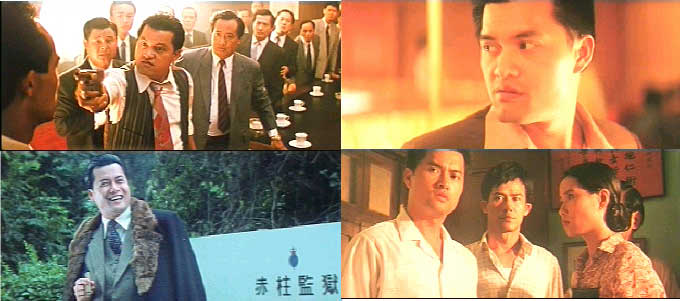
Raymond Wong Ho-yin
This handsome young actor has shown up in a
number of Milkyway Image films – generally very small roles, but they are
incrementally getting larger. Perhaps he will soon graduate from supporting
to starring role (not least since, unlike Lam Suet and Hui Siu Hung, his
looks are not what one would associate with a character actor). He was
in Johnnie To’s Lifeline (the rookie firefighter) and also appears in Expect
the Unexpected (the young cop), Sealed with a Kiss (the shy fireman that
Yoyo Mung falls for), Where a Good Man Goes (the sympathetic cop), Help!!!
(the final metamorphasis of the tramp and then the doctor at the very end),
Needing You (the Internet entrepreneur) and Wu Yen (an ‘ugly man’ named
Tsi).
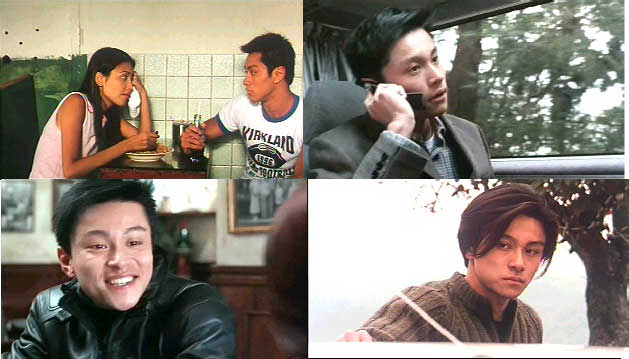
Raymond Wong Pak-ming
Born in 1948 in Hong Kong
Raymond’s crumpled pillowcase Howdy Doody face
has been on the Hong Kong film scene since the early 1980’s as an actor/scriptwriter/producer.
A lot of HK film fans look down on his product with complete derision considering
him as a second rate Wong Jing, but if you look at the totality of his
career it is not at all unimpressive. Often the focus of this mocking tone
is centered on his “boys chasing girls” juvenile comedies that he did with
Cinema City, but he has produced some fine films as well.
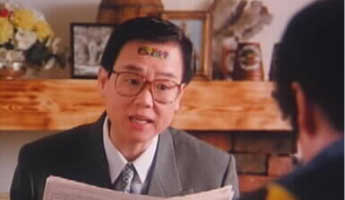 He began as a radio announcer in Macau and then
went into the world of television. In 1980 along with Karl Maka and Dean
Shek, he formed the film company Cinema City. For a number of years in
the 80’s Cinema City was highly successful with all three of the founders
shepherding their films through. Raymond discovered the “Happy Troupe Girls”
who consisted of a number of young actresses – Loletta Lee, Ann Bridgewater,
Fennie Yuen, Bonnie Law and Charine Chan – and popularized them in a series
of comedies. All five of them can be found in one of Raymond’s most despised
films, Isle of Fantasy, in which he ends up on a deserted island with all
five of them. A fantasy indeed! Though no doubt these films can be puerile,
the wonderful charms of his actresses make them enjoyable to some degree.
He began as a radio announcer in Macau and then
went into the world of television. In 1980 along with Karl Maka and Dean
Shek, he formed the film company Cinema City. For a number of years in
the 80’s Cinema City was highly successful with all three of the founders
shepherding their films through. Raymond discovered the “Happy Troupe Girls”
who consisted of a number of young actresses – Loletta Lee, Ann Bridgewater,
Fennie Yuen, Bonnie Law and Charine Chan – and popularized them in a series
of comedies. All five of them can be found in one of Raymond’s most despised
films, Isle of Fantasy, in which he ends up on a deserted island with all
five of them. A fantasy indeed! Though no doubt these films can be puerile,
the wonderful charms of his actresses make them enjoyable to some degree.
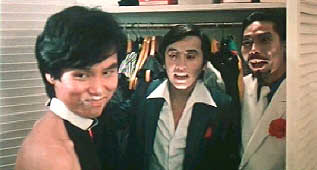 Many of his Cinema City films were quite popular
in fact such as the Happy Ghost series. He acted in many of these films
– his overgrown schoolboy lecher persona becoming his trademark character.
The Occupant, Seven Years Itch and Goodbye Darling were good examples of
this type of character.
Many of his Cinema City films were quite popular
in fact such as the Happy Ghost series. He acted in many of these films
– his overgrown schoolboy lecher persona becoming his trademark character.
The Occupant, Seven Years Itch and Goodbye Darling were good examples of
this type of character.
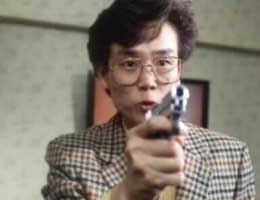 After leaving Cinema City, he continued producing,
writing and acting – and his films tended to become a bit more mature and
at times his films even ventured into the territory of being artistic.
Some of these better known films in which he had a hand in were Girls without
Tomorrow, Satin Steel, The Chinese Feast, The Phantom Lover and Eighteen
Springs (a couple of which are produced under the aegis of his Mandarin
Films, as was the Bride with White Hair -- look out for him, acting all
serious for a change, in Tai Seng’s “making of” special for the 1993 film
that stars Brigitte Lin and Leslie Cheung). He has also been behind many
of the star studded Chinese New Year films such as the All’s Well that
Ends Well series and Ninth Happiness. He has not slowed down much and has
recently produced The Mirror in 1999, Paramount Hotel and Esprit D’Amour
in 2000.
After leaving Cinema City, he continued producing,
writing and acting – and his films tended to become a bit more mature and
at times his films even ventured into the territory of being artistic.
Some of these better known films in which he had a hand in were Girls without
Tomorrow, Satin Steel, The Chinese Feast, The Phantom Lover and Eighteen
Springs (a couple of which are produced under the aegis of his Mandarin
Films, as was the Bride with White Hair -- look out for him, acting all
serious for a change, in Tai Seng’s “making of” special for the 1993 film
that stars Brigitte Lin and Leslie Cheung). He has also been behind many
of the star studded Chinese New Year films such as the All’s Well that
Ends Well series and Ninth Happiness. He has not slowed down much and has
recently produced The Mirror in 1999, Paramount Hotel and Esprit D’Amour
in 2000.
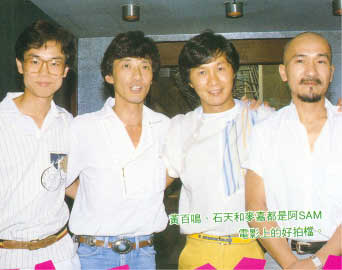
Rebecca Pan Di-hua/Poon Dik-wah/Pan Wan Ching
Born in Shanghai
Rebecca has sadly only deigned to appear in
a few films – generally highly regarded ones – but she always makes quite
an impression. She is much more known for her singing career that was extremely
popular back in the 1960s.
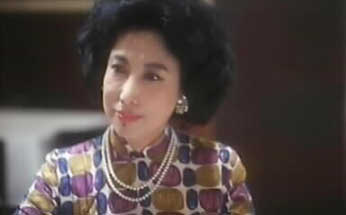 Her singing career began in 1957 when she stood
in for an act that quit. She began singing in a band, but eventually broke
off to go with a solo cabaret act that took the city by storm. She was
a sensation with her mix of songs and styles – as she sang in Chinese,
English, Japanese, French and Spanish. She took her act on tour all over
the world and was the first entertainer to have a fan club in Hong Kong
in 1962.
Her singing career began in 1957 when she stood
in for an act that quit. She began singing in a band, but eventually broke
off to go with a solo cabaret act that took the city by storm. She was
a sensation with her mix of songs and styles – as she sang in Chinese,
English, Japanese, French and Spanish. She took her act on tour all over
the world and was the first entertainer to have a fan club in Hong Kong
in 1962.
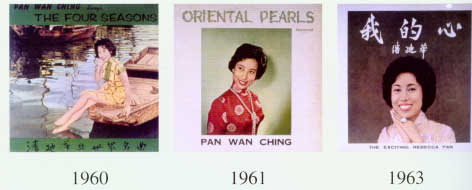 She also produced Hong Kong's first Mandarin pop
musical, Madam White Snake, in 1972 and though it fared poorly at the boxoffice
it is credited with being a major influence on the soon to emerge Cantopop
scene. Sam Hui told her "'Have you forgotten? My idea came from your
musical.' Her singing career slowed down in the 70's and 80's but she still
appeared in Las Vegas and at other venues. For someone interested in her
music, I strongly recommend finding "The Hong Kong Shanghai Legend - Rebecca
Pan 101 Songs" that comes with a booklet that contains many terrific pictures
of her.
She also produced Hong Kong's first Mandarin pop
musical, Madam White Snake, in 1972 and though it fared poorly at the boxoffice
it is credited with being a major influence on the soon to emerge Cantopop
scene. Sam Hui told her "'Have you forgotten? My idea came from your
musical.' Her singing career slowed down in the 70's and 80's but she still
appeared in Las Vegas and at other venues. For someone interested in her
music, I strongly recommend finding "The Hong Kong Shanghai Legend - Rebecca
Pan 101 Songs" that comes with a booklet that contains many terrific pictures
of her.
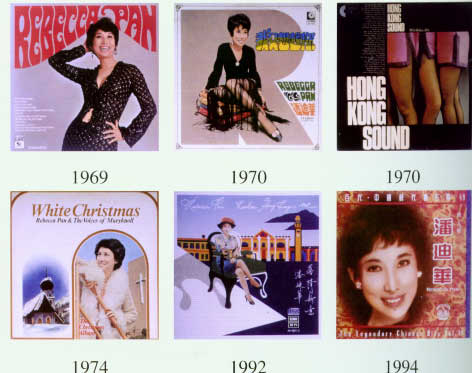 In 1988 she appeared in the Ann Hui film, Starry
is the Night, and then a year later she had the terrific role as Leslie
Cheung’s foster mother in Wong Kar Wai’s Days of Being Wild. After this
another long acting sabbatical took place until 1999 when she appeared
as one of the brothel owners in Hou Hsiao-hsien’s Flowers of Shanghai.
Her Shanghai roots allowed her to easily meld into the role and speak the
Shanghai dialect that was utilized. In 2000 she returned for another Wong
Kar-wai film – In the Mood for Love – as the landlady and one of her songs
is played briefly in the film - the English version of an Indonesian folk
song, Bengawan Solo (the full version appears on the sound track).
In 1988 she appeared in the Ann Hui film, Starry
is the Night, and then a year later she had the terrific role as Leslie
Cheung’s foster mother in Wong Kar Wai’s Days of Being Wild. After this
another long acting sabbatical took place until 1999 when she appeared
as one of the brothel owners in Hou Hsiao-hsien’s Flowers of Shanghai.
Her Shanghai roots allowed her to easily meld into the role and speak the
Shanghai dialect that was utilized. In 2000 she returned for another Wong
Kar-wai film – In the Mood for Love – as the landlady and one of her songs
is played briefly in the film - the English version of an Indonesian folk
song, Bengawan Solo (the full version appears on the sound track).
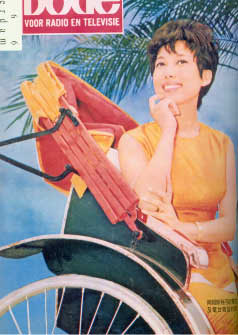 In the In the Mood for Love soundtrack album’s
liner notes, Wong Kar Wai is quoted as follows about the woman with whom
he has had a long artistic association:- “I met Rebecca Pan before
I filmed Days of Being Wild. She is very knowledgable about music
in the West and she was instrumental in introducing me to the music of
Xavier Cugat (used by WKW in Days of Being Wild). When we filmed
In the Mood for Love, Rebecca let me listen to her rendition of ‘Bengawan
Solo’, which she recorded when she was 18.”
In the In the Mood for Love soundtrack album’s
liner notes, Wong Kar Wai is quoted as follows about the woman with whom
he has had a long artistic association:- “I met Rebecca Pan before
I filmed Days of Being Wild. She is very knowledgable about music
in the West and she was instrumental in introducing me to the music of
Xavier Cugat (used by WKW in Days of Being Wild). When we filmed
In the Mood for Love, Rebecca let me listen to her rendition of ‘Bengawan
Solo’, which she recorded when she was 18.”
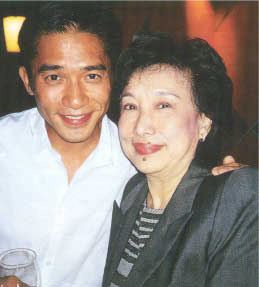
Regina Kent/Kan Wai-ling
This sweet faced actress appeared in a few
films in the late 80s - as one of the supporting cast. Sadly, she passed
away from brain cancer in 2000 at the age of 31.
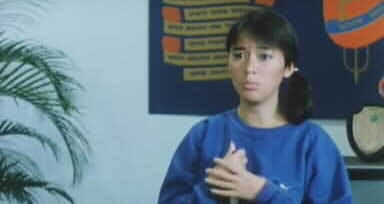 Some of her films were: Inspector Wears Skirts
1 & 2, Legacy of Rage (Brandon Lee’s girlfriend), Chinese Cop Out,
Club Girls, A Better Tomorrow II (the daughter of Dean Shek), Project A
II (Regina), Ghost in the House (the maid) and Vampire vs. Vampire.
Some of her films were: Inspector Wears Skirts
1 & 2, Legacy of Rage (Brandon Lee’s girlfriend), Chinese Cop Out,
Club Girls, A Better Tomorrow II (the daughter of Dean Shek), Project A
II (Regina), Ghost in the House (the maid) and Vampire vs. Vampire.

Richard Ng Yiu-hon
Richard Ng is something of an acquired taste
I think for most Westerners, but his comic style was very popular in HK
in the eighties until the early 90s (something which might account for
the numerous cameo and supporting appearances he made in films as diverse
as Yes Madam, The Banquet and Ah Kam). After spending many years
in London (where he tells that he was so poor that he considered robbing
an old lady walking by), he came back to Hong Kong and began as a TV actor
in the 70s and gained some fame as a regular on the groundbreaking show
from Michael Hui. In the 80s his arching eyebrows and wide mouth made him
perfect for the often eccentric, often conniving characters that he took
on. Many of these characters had a dour and pessimistic outlook on life,
but Ng could still imbue them with a comic quirkiness that was endearing.
His “invisible man” routine in Winners and Sinners is a classic.
 The man given the nickname of ‘Shoehorn’ (for
his prominent chin) was in two very popular series during these years -
starting with The Lucky Star series (Winners and Sinners in 1983, Twinkle
Twinkle Lucky Star, My Lucky Stars, Lucky Stars Go Places, Return of the
Lucky Stars, Ghost Punting). In 1984 he also began his film collaboration
with John Shum in the Pom Pom series (Pom Pom, Return of Pom Pom, Mr. Boo
Meets Pom Pom and Pom Pom Strikes Back).
The man given the nickname of ‘Shoehorn’ (for
his prominent chin) was in two very popular series during these years -
starting with The Lucky Star series (Winners and Sinners in 1983, Twinkle
Twinkle Lucky Star, My Lucky Stars, Lucky Stars Go Places, Return of the
Lucky Stars, Ghost Punting). In 1984 he also began his film collaboration
with John Shum in the Pom Pom series (Pom Pom, Return of Pom Pom, Mr. Boo
Meets Pom Pom and Pom Pom Strikes Back).
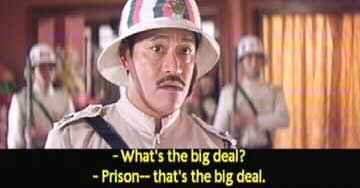 Besides these, Ng was in a load of other comedies
(including Boys are Easy, in which he plays the father of the dream trio
of Brigitte Lin, Maggie Cheung and Chingmy Yau) along with appearing as
the comic relief in action films (e.g., Magnificent Warriors) and the kind
of period fantasies that didn’t seemed to know whether to take its genre
seriously or not (to wit: Handsome Siblings). However, in an interesting
detour, he also appeared in a generally serious supporting role in the
melodramatic film Red Dust as Brigitte Lin's quiet admirer.
Besides these, Ng was in a load of other comedies
(including Boys are Easy, in which he plays the father of the dream trio
of Brigitte Lin, Maggie Cheung and Chingmy Yau) along with appearing as
the comic relief in action films (e.g., Magnificent Warriors) and the kind
of period fantasies that didn’t seemed to know whether to take its genre
seriously or not (to wit: Handsome Siblings). However, in an interesting
detour, he also appeared in a generally serious supporting role in the
melodramatic film Red Dust as Brigitte Lin's quiet admirer.
For the most part he has retired and lives
in Singapore - but on two occasions in 2000, he returned to make small
appearances - in Sausalito as Leon Lai's gay friend and in a cameo role
in Jiang Hu: The Triad Zone as a street vendor in London.
(Info provided by Cissi)

Richard Norton
This Australian has been one of the more distinct
gwielo bad guys in HK films with his long narrow face, disdainful looks
and his ability to seem very nasty. Though he is usually the boss as opposed
to a henchman, he still has shown some pretty tough moves.
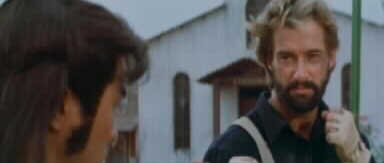 He was of course the main bad guy in Jackie Chan's
City Hunter and Mr. Nice Guy and also showed up as a villain in two Sammo
Hung films - Millionaires Express and Twinkle Twinkle Lucky Star. Magic
Crystal is another HK film that he has appeared in.
He was of course the main bad guy in Jackie Chan's
City Hunter and Mr. Nice Guy and also showed up as a villain in two Sammo
Hung films - Millionaires Express and Twinkle Twinkle Lucky Star. Magic
Crystal is another HK film that he has appeared in.
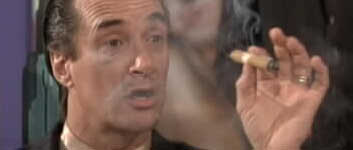 He has also shown up in a number of “B” action
films made outside of Hong Kong such as The Octagon (1980), American Ninja
(1985), Gymkata (1985), China O’Brien (1990 - which stars one of
the rare Americans who is a Hong Kong movie fan favorite, Cynthia Rothrock),
Lady Dragon (1992), Redemption (2001) and many more.
He has also shown up in a number of “B” action
films made outside of Hong Kong such as The Octagon (1980), American Ninja
(1985), Gymkata (1985), China O’Brien (1990 - which stars one of
the rare Americans who is a Hong Kong movie fan favorite, Cynthia Rothrock),
Lady Dragon (1992), Redemption (2001) and many more.
Richie Ren Xian Qi
This very popular Taiwanese singer has made
a few recent film appearances. I can't say his acting ability has impressed
me all that much, but he does have a genial personality that does come
across on the screen.
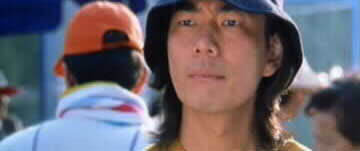 His best role was as the blind man who Cecilia
Cheung falls in love with in the huge hit Fly Me to Polaris in 1999. He
was also Hsu Chi's despondent boyfriend in Gorgeous and was Sammi Cheng's
co-star in the easy going Summer Holiday in which he sings a couple nice
tunes (but has his Cantonese dialogue dubbed by someone else here as well
as in his other Hong Kong films)..
His best role was as the blind man who Cecilia
Cheung falls in love with in the huge hit Fly Me to Polaris in 1999. He
was also Hsu Chi's despondent boyfriend in Gorgeous and was Sammi Cheng's
co-star in the easy going Summer Holiday in which he sings a couple nice
tunes (but has his Cantonese dialogue dubbed by someone else here as well
as in his other Hong Kong films)..
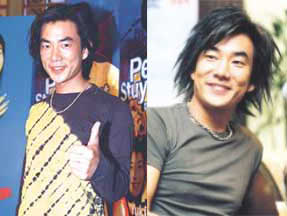
Ricky Hui Goon-ying
Ricky is of course the third Hui brother to
make a name in the world of HK film comedy. Although billed as the "third
brother", Ricky was actually the second born. While Michael's screen persona
was one of a droll wit and Sam was more the romantic/action leading man
type, Ricky's comedy fell more into the tradition of being the slow dim-witted
one. Upon seeing Ricky Hui’s blank looking face, the immediate thought
one might have is "here is a sap-headed born-loser", and naturally this
is the kind of role Ricky has done since nearly the beginning of his career.
 Originally a newspaper correspondent for the France
Presse agency in Hong Kong, Ricky found his way into TV and then movies
probably through his brother, Michael Hui. Ricky was a graduate of the
Shaw Brother’s acting classes but it was at rival studio Golden Harvest
where he found his first substantial role. In his brother’s directorial
debut Games Gamblers Play he was a thug of all things. But it was in Michael
Hui’s classic Private Eyes that he took on what was to become his trademark
characteristics as the long suffering bumbling sap who is forever the victim.
Originally a newspaper correspondent for the France
Presse agency in Hong Kong, Ricky found his way into TV and then movies
probably through his brother, Michael Hui. Ricky was a graduate of the
Shaw Brother’s acting classes but it was at rival studio Golden Harvest
where he found his first substantial role. In his brother’s directorial
debut Games Gamblers Play he was a thug of all things. But it was in Michael
Hui’s classic Private Eyes that he took on what was to become his trademark
characteristics as the long suffering bumbling sap who is forever the victim.
Ricky was to appear in many of Michael's films
- even after the rift between Michael and Sam. These collaborations – some
of which are considered classics - were The Contract, Security Unlimited,
Happy Din Don (the bedroom suitor), Inspector Chocolate, Mr. Coconut, Front
Page and The Magic Touch. In the films that he made with his brothers he
was often the comic foil for their antics. With his Beatle like haircut,
sleepy looks and slow moving expressions, he was the perfect easy target.
 Though Ricky Hui is often identified with his
brothers, he also had a successful career away from them. In 1977 Ricky
got to star in his own movie becoming a comic star in his own right. In
this film, Pilferer’s Progress (Aka: Money Crazy), he co-starred with urban
trickster Richard Ng and played his usual hopeless sap headed role. The
film, directed by John Woo, was the second ranking box-office hit of 1977.
This was the beginning of a fruitful collaboration between Ricky and Woo
with Ricky coming back for Rags to Riches (1980), Woo’s darkest comedy,
Hell from the Devil (81) his most daring effort and Plain Jane To The Rescue
(81) which co-starred Josephine Siao.
Though Ricky Hui is often identified with his
brothers, he also had a successful career away from them. In 1977 Ricky
got to star in his own movie becoming a comic star in his own right. In
this film, Pilferer’s Progress (Aka: Money Crazy), he co-starred with urban
trickster Richard Ng and played his usual hopeless sap headed role. The
film, directed by John Woo, was the second ranking box-office hit of 1977.
This was the beginning of a fruitful collaboration between Ricky and Woo
with Ricky coming back for Rags to Riches (1980), Woo’s darkest comedy,
Hell from the Devil (81) his most daring effort and Plain Jane To The Rescue
(81) which co-starred Josephine Siao.
 In the early eighties Ricky starred in a number
of supernatural oriented comedy thrillers such as Ronny Yu’s The Trail
(produced and written by brother Michael), the bumbling disciple in Mr
Vampire (1985) and Haunted Cop Shop I and II directed by Jeff Lau. Besides
doing starring roles, Ricky also made many guest cameos in films throughout
the eighties - Naughty Boys, Project A II, Inspector Wear Skirts I &
II, Mr. Canton and Lady Rose.
In the early eighties Ricky starred in a number
of supernatural oriented comedy thrillers such as Ronny Yu’s The Trail
(produced and written by brother Michael), the bumbling disciple in Mr
Vampire (1985) and Haunted Cop Shop I and II directed by Jeff Lau. Besides
doing starring roles, Ricky also made many guest cameos in films throughout
the eighties - Naughty Boys, Project A II, Inspector Wear Skirts I &
II, Mr. Canton and Lady Rose.
In the nineties Ricky Hui made many fewer appearances
in films - two films with his brother Sam in the 90's - Laughter of the
Water Margins (in which he gets to sing) and All's Well End's Well, Too
(in which he plays Sam's mother!). All but retired, he has appeared in
only two other films in the past 8 years - First Love Unlimited in 1997
and then he joined Sam again in a Winner Takes All in 2000.
(Written up by Yves Gendron)


























